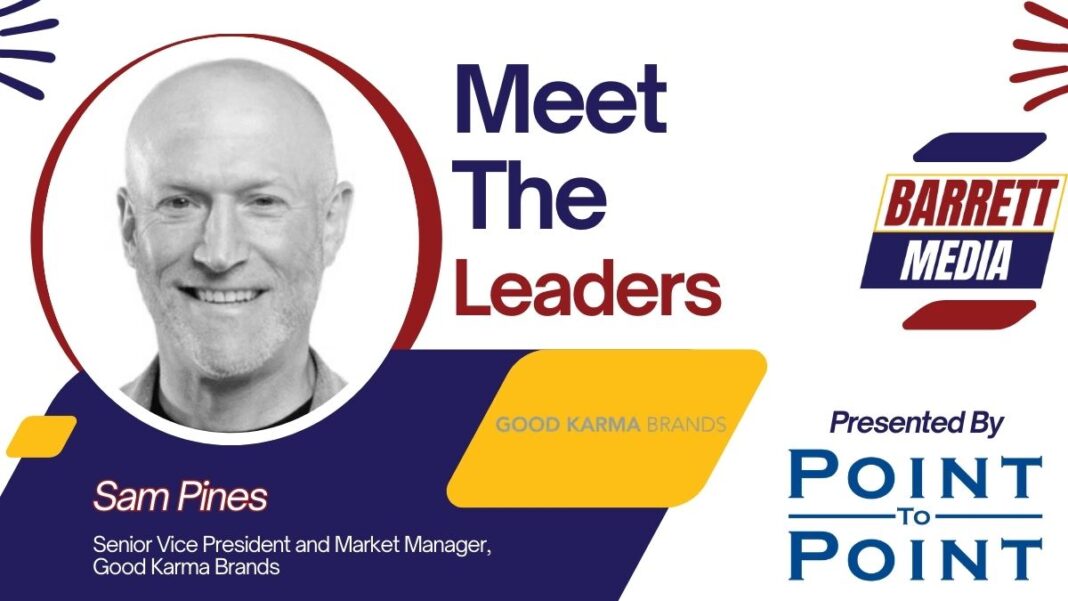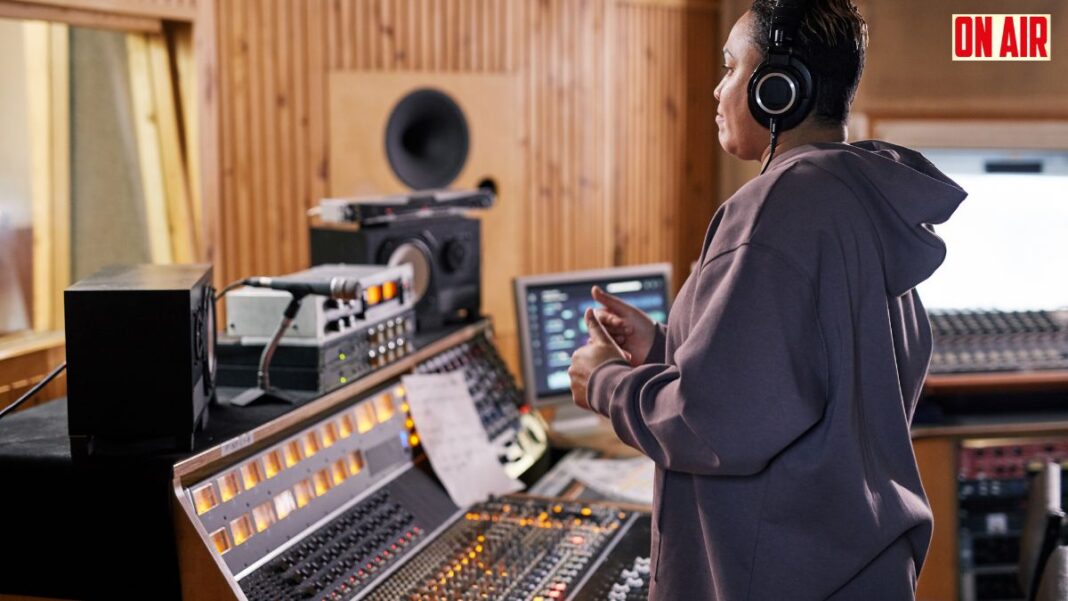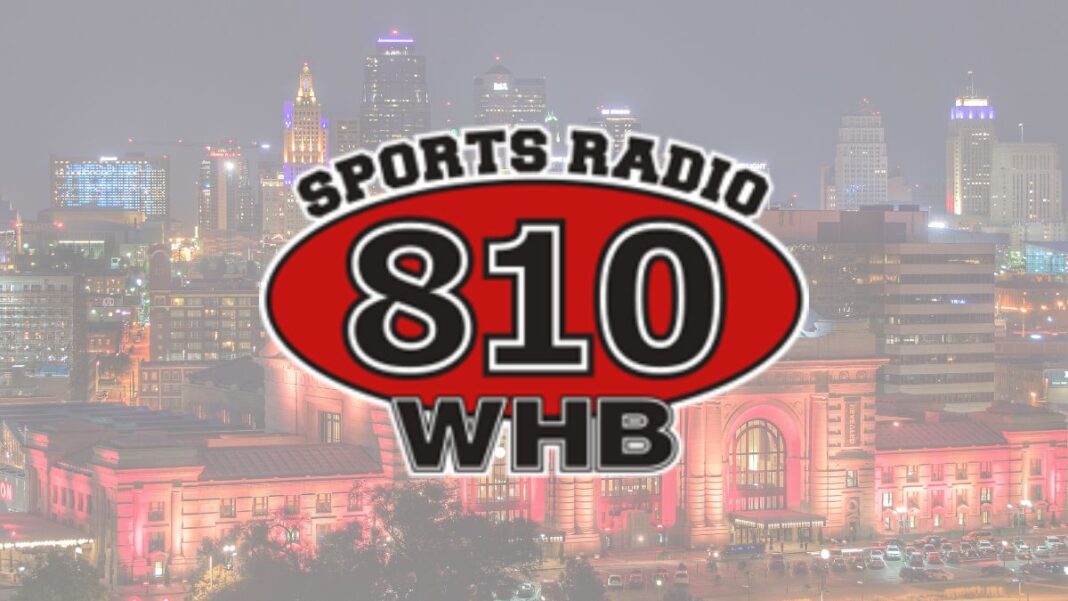Barrett Media produces over 20 stories per day on the music, news, and sports media industries. To make sure you’re updated on the latest happenings across the media business, sign up for our newsletters to get the news delivered straight to your inbox.
Good Karma Brands is one of the most unique companies in the radio space. The company was focused almost exclusively on local sports brands for years. That changed last year with an expansion to its agreement with ESPN Radio.
Sam Pines has been with the company since 2000. In that time, he has led the company’s properties in Madison, Cleveland, Milwaukee, and Los Angeles. Most recently, he added leadership responsibilities at ESPN Radio and Podcasts.
In the latest conversation for our Meet the Leaders series presented by Point-to-Point Marketing, Sam and I talk about how the company has defined its own approach to measuring audience impact, how the company views its relationships with its play-by-play properties, and why cheeseburgers matter so much to the way they work with advertisers.
You’ll see the phrase “fans, partners and teammates” a lot in this interview. It’s the prism through which the company sees everything and measures its success. Enjoy!
Demetri Ravanos: How does GKB see itself? As the partnership with ESPN Radio expands, does that make you one of the big boys in the radio business or are you still small enough to move quickly on good ideas?
Sam Pines: I guess I would go a couple ways with that. We see ourselves as a best-in-class operator of world class brands, obviously ESPN being a big one of those. I think if I had answered this a year and a half or two years ago, I would have said “best in class local operator of world class brands.”
The idea of how we see ourselves is really in focusing on our fans, partners and teammates. Those are the three that have mattered, whether we’re in Beaver Dam, Wisconsin, where we still are in operating or the ESPN Radio Network, which operates in every Beaver Dam and every big market. But the fundamentals and what we’ve done in the past are still there and hopefully stronger than ever.
DR: We have talked about your LinkedIn presence and direct communication with the GKB team before. Why do you think the ‘Time to Win’ columns you write strike a chord with your team and not get dismissed as just more corporate speak?
SP: First, I think it’s really important to mention that I’m not a good writer, and that is really big. It’s really because of teamwork, which is one of our core values, that, that has happened.
The quick story is there was a moment in time where I was managing Cleveland and Milwaukee. That was eight or nine years ago now. The Milwaukee sales manager at the time was Dan Carlson, and I would send a note every Monday morning. That’s really where ‘Time to Win’ came from – in that note, there’d be some kind of tip. So, as I stopped managing Milwaukee, he had asked for that to continue.
Dan and Debbie Brown, who’s one of our EVPs, really kind of championed it to the rest of the company. That’s when I had to start watching my grammar and asking other people to read it. Was I using the right “to/too/two” or whatever other mistakes that I generally make? So then during COVID, a couple of teammates had me start putting them on LinkedIn.
So, I think after doing this for 24 years, there’s thoughts in my head that, I can speak, but it’s really been a team effort to get it there. And hopefully it’s coming from a genuine voice, which is mine, and that it’s not corporate speak.
I think anyone who knows me well, probably knows there’s not a lot of corporate speak in me. When I think of corporate speak, and this is the early years of Barrett Sports Media, Jason wrote an article once saying that we had “brass balls” for doing ‘The Land on Demand’ in Cleveland, which is a subscription service For ESPN Cleveland. I liked that and used it for every communication for like…I might still use it sometimes, so, thanks, Jason!
But the point is that has always been more of my verbiage. So that’s how I hope it comes across. And it’s always fun when as the team has gotten bigger and I don’t know every teammate’s name, someone will reference something from it in a companywide call. It is nice to know it’s hitting a chord.
DR: We’ve known each other for six years or so now and in that time, I have heard you say, ‘a ratings point has never bought a cheeseburger’ probably two dozen times.
The whole company is really living that motto now in your new approach to measuring your stations’ impact. What have been some of the benefits of moving away from Nielsen as a company?
SP: For us it goes back to fans, partners and teammates. First of all, I don’t know how much I can say about Nielsen, but I think they are a data point, obviously a data point you have to invest for, and every company should make their own decision.
As we looked at our fans, partners and teammates and focused on those and really had our sales and marketing teams focus on those, we didn’t think Nielsen was the best way for us to do that as a sports marketing company. Having some of the other resources we have now, and knowing that 20% of our audience is streaming in some of our local markets, that means we know that, for every streamer, there’s four other fans, right? Edison’s “Share of Ear” has that report. There are other ways to get a reliable number.
We’ve also invested in our own research teammates and Eric Davidson, who’s one of the other founding partners, heads up our research. That wasn’t a role when we had less teammates.
The ultimate answer for our research is “is our team putting out content that our fans are hearing and supporting our partners?” and that feedback from the partners. Are we helping them reach and exceed their objectives? Those are really key metrics for us.
Look, if Nielsen would like to give their numbers to us for free, we would take it.
DR: What is it we are saying or asking when we talk about radio’s overall share of the audience being down or needing adjustments to the way those ratings are measured? Is there anything wrong with radio’s audience? Is it too old or too small or, this is something Ginny Hubbard pointed out last week, is the problem in how we talk about our audience and the future?
SP: I guess you have to answer, “what is radio?” which I think is interesting. It’s not just audio, right? If you take ESPN LA, we’re the first sports radio station to cross a million social media followers. Karlo Sy Su and the team are amazing.
If you haven’t already, watch our YouTube channel, because the things that are going on there, that’s radio now, right?
I had one of our marketing consultants go into a partner’s business, and he said on their TV was our show, no differently than they would have had First Take up there in the past. With audio, video, and 24-hour consumption, I think we need to be talking at least about the whole consumption, and how fans are really interacting with it throughout the day. And so, probably a little bit of a broken record. But when we look at our partners, what’s the right solution?
DR: Tell me a bit about the state of your play-by-play partnerships. I know it’s an area that has always been important to you, but this year, there has been a lot of evolution. Whether it’s content sharing in New York or the premium product you launched along with the Milwaukee Bucks, it seems like the idea of what play-by-play means to the radio business is evolving.
SP: We treat those play-by-play partners no differently than a big advertising partner, and you know, what is right for the Rams might be different for the Browns or different for the White Sox. We look at what is best for them and best for our fans. Each partnership, it’s not “how do we get the most play-by-play?”, right.
Live sports are pretty important right now. I mean, we see the numbers when it’s on TV. The consumption of live sports, it’s the one thing that you can’t watch back. So, for us, and in LA specifically, being able to add USC football, men’s and women’s basketball and being able to add LA Kings hockey and having all those games and knowing that they’ll be on the ESPN LA app and that can become the home for an LA sports fan, and they’re going to get 500 live sporting events. We think it’s really easy on our fans to consume all that. It’s great for our partners, like USC, the Kings, and all of our team partners prior to that. And hopefully it’s good for our advertising partners.
The Bucks+ partnership, I’m not that close to, but it’s really exciting to be creating unique content with the team. It really is pretty cool.
DR: In terms of what’s best for advertising partners, I want to circle back on the cheeseburger/ratings point idea. What is the state of advertiser relationships in the industry as a whole? There is so much data available to anyone at any time that I wonder how you make sure those partners are basing their decisions and satisfaction on the best information.
SP: We’re in an interesting space where there’s some marketing that’s really easy to measure. You can pixelate it to the smallest detail. This is for audio too. That’s interesting to advertising partners. Then there’s a whole other space of consumption that isn’t as easy to measure.
We have seen this before. I think it was called “last click attribution” when digital first came out.
I think the whole funnel is where, if I was looking at the state of the marketer and of the advertiser, there probably needs to be more focus, not just “let me show you how I know it worked.” There needs to be an entire focus on the funnel and the top of the funnel and bringing the brands to the top of the list of consideration when a fan is in the market for the product.
So, if you’re only reaching cheeseburger fans when they’re hungry, you’ve missed a bunch of cheeseburger fans when they weren’t hungry to get top of mind with them, that’s when we use the cheeseburger analogy.
DR: How flexible can radio be in terms of their talent and what they are allowed to do outside of their contract?
SP: It’s a challenge. If I just take LA as an example, that’s multiple teammates. So, when we’re making decisions, it becomes “are we investing in teammates first or are we investing in technology?” You have to invest in both. It’s finding that balance. Those are the decisions as leaders we get to make.
Where I think [Good Karma Brands Founder and CEO] Craig Karmazin has always been really good is once we make the investment, continue to invest in it and evaluate it to make sure that we’ve made the best decision. If we have to pivot, we have to pivot and be flexible and adaptable to do that reality.
DR: But how flexible can radio be in terms of what opportunities talent can pursue and still allow the station to maintain a unique offering?
SP: We operate in a way where every answer is case by case. I think of John Ireland with the Lakers. We’ve also had teammates on the Browns Radio Network.
In general, again going to our themes of fans, partners, and teammates, if our teammates can further their careers and grow, we want them to do that. And I would think a combination of a variety of outlets would bring more people than just what they do with us alone. We’ve always had that mentality.
I think if you look at what Evan Cohen was able to do, from the time he was a local host at ESPN West Palm, he was also doing sports on TV. Then, obviously, he went to Sirius and that means he is generating revenue that we will never see, but if we don’t let him do those things, both ESPN West Palm and he don’t grow, to the points they have.
To learn more about Point-To-Point Marketing’s Podcast and Broadcast Audience Development Marketing strategies, contact Tim Bronsil at tim@ptpmarketing.com or 513-702-5072.

Demetri Ravanos is a columnist and features writer for Barrett Media. He is also the creator of The Sports Podcast Festival, and a previous host on the Chewing Clock and Media Noise podcasts. He occasionally fills in on stations across the Carolinas in addition to hosting Panthers and College Football podcasts. His radio resume includes stops at WAVH and WZEW in Mobile, AL, WBPT in Birmingham, AL and WBBB, WPTK and WDNC in Raleigh, NC.
You can find him on Twitter @DemetriRavanos or reach him by email at DemetriTheGreek@gmail.com.









